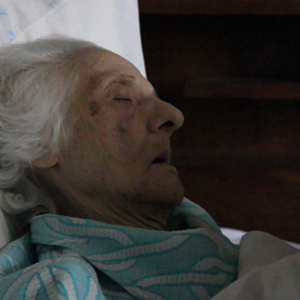A last year in 114 minutes (2013)
Director: Daniel Djamo
Country: Romania
Genre: Documentary
Official Trailer: Here
Editor’s Notes: The following review is part of our coverage of the Transilvania International Film Festival. For more information visit http://tiff.ro/en and follow TIFF Romania on Twitter at @tiffromania.
Photographer, filmmaker, and writer Daniel Djamo’s documentary is an audiovisual journal of footage shot from the end of October 2010 to early October 2011, marked by dates and slices of life. It is a direct confrontation not necessarily with the self, since Djamo is not the subject, but rather mortality through his grandmother Buni. The audiovisual journal entries, as it were, consist of scenes of Djamo’s grandmother either lying in bed or sitting in a chair inside her apartment whenever Djamo visits her to tend to her needs. While its formal rigour of fixed camera, long takes, and medium shots may try the patience of even the most attentive spectators, in the course of the film, one realises that the minimalist form reflects her largely immobile and closed-in world due to the unforgiving grip of old age. As such, those who stick with the film will not be left unmoved or drawn into the charming personality of Buni, as she grows to feel like one’s relative whom one is visiting with Djamo.
While its formal rigour of fixed camera, long takes, and medium shots may try the patience of even the most attentive spectators, in the course of the film, one realises that the minimalist form reflects her largely immobile and closed-in world due to the unforgiving grip of old age.
The first journal entry establishes the unchanging fixed camera, level to a bed or chair, and the long take, in order to concentrate on Buni, the passing of real time, and the weight of time on her body (and by extension the spectator). Most of the time the only person onscreen is Buni; sometimes Djamo sits next to her as they converse. In truth, they do not say much in terms of content; when Buni asks him a question, he provides short answers, and vice-versa. They speak of the most basic things: taking pills, when to best take them, if he is going to university, her lack of energy. Furthermore, they speak almost in whispers. But a running thread of the same question-answer develops, especially her inquiring if he is going to university or he asking her if she would like him to make some tea. She also frequently offers him all sorts of snack foods, like chocolate, cookies, yogurt, candy, even a frankfurter; and he never wants any. After about the eighth journal entry into the film, the running thread of university, snack, and tea develops a surprisingly comic edge, like a strange Abbott and Costello-esque routine, only slowed down.
 Buni remains very lucid despite her old age, even as she speaks of not being able to do things by herself anymore. In particular, she is very opinionated about taste, ultimately leading Djamo to ask if she thinks candy tasted better during Communist times (she replies affirmatively). During this particular conversation, the power goes out. And yet their conversation continues, the film continues. Even though she continually speaks of a lack of energy, she carries a conversation rather well, even if the range of topics is minimal. Rightly so, for her world has become smaller and simplified with old age, limited to her apartment—a fly in the room, the temperature of the room—limited to her bed or chair, limited to her body, and in some ways, limited to the edges of the film frame.
Buni remains very lucid despite her old age, even as she speaks of not being able to do things by herself anymore. In particular, she is very opinionated about taste, ultimately leading Djamo to ask if she thinks candy tasted better during Communist times (she replies affirmatively). During this particular conversation, the power goes out. And yet their conversation continues, the film continues. Even though she continually speaks of a lack of energy, she carries a conversation rather well, even if the range of topics is minimal. Rightly so, for her world has become smaller and simplified with old age, limited to her apartment—a fly in the room, the temperature of the room—limited to her bed or chair, limited to her body, and in some ways, limited to the edges of the film frame.
But what they lack in conversation is made up for in the small, affectionate gestures that they extend towards each other, principally holding hands. In this regard, the film makes no claims to be a transcendent work on aging, time, and mortality, with Buni as an undiscovered philosopher equipped with a bon mot for every subject. For his part, Djamo does not try to draw her out by resorting to the frequent method of the interview to have her recount the chronology of her life, as would be expected in a more traditional-minded documentary. Rather, it is a raw, humble, and unadorned still life (meaning still among the living but also immobile) that is more concerned with the everydayness of aging of this particular person by someone who knows her personally and less with presenting her as a symbol of something.
Even when Buni weakens considerably during the last three-four journal entries, the film remains matter-of-fact, supported by the unchanging way that Djamo has chosen to capture her on camera.
Even when Buni weakens considerably during the last three-four journal entries, the film remains matter-of-fact, supported by the unchanging way that Djamo has chosen to capture her on camera. In other words, do not look for any ‘Oh, woe is me’ sentimentality here. At the same time, the film’s neutral, even stoic tone and attitude is not devoid of emotion. In fact, when Djamo says in the last journal entry, ‘I will miss you’ from off-screen, with such frank simplicity and finality, it is incredibly poignant.
After a protracted phone conversation with her daughter Olga (who is presumably abroad and therefore unable to be by her side), during which time she essentially says her goodbyes, the film cuts to an intertitle that states that Buni died in her sleep several weeks later. Yet what follows is not the closing credits but rather footage of Buni, as if resurrecting her (embalming her audiovisually, as André Bazin would say). She gets up from her bed, with Djamo’s help, and leaves the frame to go to the bathroom while they converse. She has only left the frame.
Those who stick with the film will not be left unmoved or drawn into the charming personality of Buni, as she grows to feel like one’s relative whom one is visiting with Djamo.




